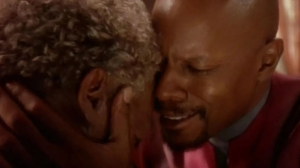Marvel Studios president and Marvel Cinematic Universe architect Kevin Feige admits he once worried 2008’s Iron Man, the first production from a studio then in its infancy, wouldn’t make it into theaters.
Videos by ComicBook.com
“It’s surreal. In one way it’s incredibly satisfying. In the other way it’s nearly unbelievable from where we started,” Feige told Variety of the now Disney-owned studio’s 20 consecutive box office hits.
“There were days when I wasn’t sure we would be able to get Iron Man in theaters. There were days when I thought [The] Avengers was a pipe dream. And there were days after Avengers where I thought, ‘Well, where do we go?’”
In 1996, Marvel filed for bankruptcy, resulting in its selling off the screen rights to its marquee names: Spider-Man went to Sony, the X-Men to Fox, and Blade to New Line Cinema.
A Marvel gold rush saw Hulk, Daredevil, the Punisher and others brought to screen — to varying results and degrees of success, each giving Marvel just a small slice of the pie — causing Marvel to re-examine its deals and explore the prospect of developing its characters internally.
After securing financing from Merrill Lynch and launching its independent studio, Marvel Studios teamed with distributors Paramount Pictures for its first film headlined by a then-B-lister whose name meant little outside the pages of the Marvel Comics universe: subversive playboy superhero Tony Stark, played by an even riskier Robert Downey Jr., whose off-screen troubles made the star a major gamble.
“The funny thing about the plan is that Marvel used character rights as collateral,” Marvel Comics: The Untold Story author Sean Howe previously told BBC. “So if Iron Man was a disaster, they would give up a whole bunch of characters to the backers.
Such a disaster, Howe noted, would have included the Avengers — effectively killing the planned MCU right out of the gate.
The Jon Favreau-directed Iron Man proved a surprise hit, grossing more than half a billion worldwide and introducing its ambitious shared franchise when Nick Fury (Samuel L. Jackson) stepped from the shadows to inform Stark he belonged to a “bigger universe.”
The Incredible Hulk, distributed by Universal after the studio backed 2003’s Hulk, followed that summer and cemented its shared continuity when Stark appeared in its pre-credits scene.
“I think in a million years nobody would actively plan to build a studio the way Marvel Studios was built, but in hindsight, it was remarkably effective,” Feige told Variety.
“We got to work at almost every studio in town except Warner Bros. and Disney, so we got to see the inner workings at the upper levels and got to learn amazing lessons from the inside, ways that we thought were good examples of how to make a movie, perhaps ways that were not as good. So when we ended up taking advantage of the pre-2008 market crash and got financing from Merrill Lynch — which Avi Arad and David Maisel put together and got a half a billion dollars for 10 characters — I was very excited, because at that point I was very, very ready to have the creative authority.”
When celebrating its 10th anniversary in 2018, Marvel Studios passed $17 billion at the worldwide box office after releasing Ant-Man and the Wasp, its 20th consecutive #1 opener at the box office. Under Disney, the MCU was the first franchise to earn more than $5 billion in domestic receipts alone.
“Kevin Feige medivac’d me from the top of the uninsurable list to the top of the Forbes list,” Downey said Saturday at the Producer’s Guild of America Awards, where Feige was honored with the David O. Selznick Award.
Next up from Marvel Studios is Captain Marvel, out March 8, followed by Avengers: Endgame April 26 and Sony’s Spider-Man: Far From Home July 5.








